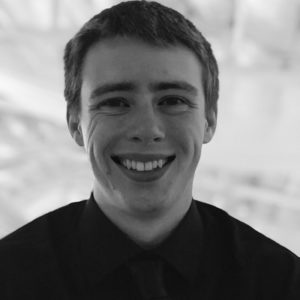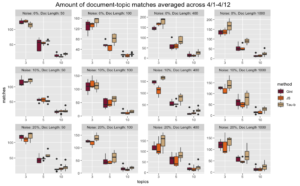DAC Student Spotlight: Shane Bookhultz

Shane Bookhultz, DAC and UrbComp Ph.D. student in the Department of Statistics

Graphic is from Bookhultz’s poster presentation “Measuring Polarity from News Sources: a Topic Modeling Approach”
“Working with text data is challenging but that is what I like about it,” said Shane Bookhultz, a Ph.D. student in the Department of Statistics. “It is inherently noisy because of different mannerisms, choices of words, and tones. Unlike numerical data, which is pretty concrete, text data can have various interpretations.”
Bookhultz — who is also a research trainee in the National Science Foundation-sponsored Urban Computing graduate certificate program — was introduced to this research area by his advisor, Scotland Leman. Then he started exploring more text issues with different media.
Using media like news, twitter, etc., he tracks information flows across time and uses these flows to generate a polarization “barometer” to indicate which days are more inciting than others.
“If we can detect a polarizing and potentially high impact event in advance we may be able to help diffuse it,” he said.
Bookhultz has presented a poster of his work, “Measuring Polarity from News Sources: a Topic Modeling Approach” at two conferences: in May at the 2019 Spring Research Conference of the Institute of Mathematical Statistics and the American Statistical Association Section on Physical and Engineering Sciences (SPES), which was hosted by the Department of Statistics at Virginia Tech, and at the American Statistical Association’s JSM2019 in Denver this past summer.
Bookhultz earned a bachelor’s degree in mathematics from Millersville University and a master’s degree in statistics from Virginia Tech.
“The positive environment of DAC, my department, and really the whole university is a big plus,” said Bookhultz. “And my colleagues are so friendly, all encouraging each other to do well.”
He said that DAC has also provided him with opportunities to attend interesting applied lectures and talks, participate in workshops, and gain access to unique data through corporate partnerships.
After graduation, projected for May 2020, Bookhultz said he would like to be in a position to help people understand statistics. “Whether that be as a college professor or by collaborating with industry experts, I am keeping my options open,” he said.